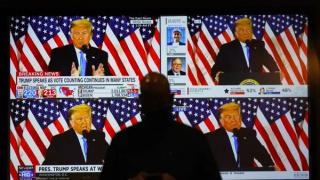Long after midnight in the United States, President Donald Trump declared he would ask the Supreme Court to intervene in the 2020 election. As far as he was concerned, he said, he had already won: "So we'll be going to the US Supreme Court. We want all voting to stop".
Trump's remarks are not only absurd, but anti-democratic.
Voting has stopped. It's the counting of votes Trump presumably wants to stop. Assuming the strictly narrow perspective of wanting to win the election above all else, it is easy to see why.
Consistent with data on the party registration of those voting early or requesting mail ballots, the overwhelming majority of this proportion of the vote are Democrats. As expected, when those votes are added to the count, Trump's early leads have been flipped and Pennsylvania and Georgia may join Wisconsin and Michigan.
In the hours since Trump's remarks, Trump's leads among votes cast on election day in Wisconsin and Michigan have been overtaken. This was widely anticipated, not a surprise nor prima facie evidence of something untoward.
Turnout is at record levels around the United States. Largely due to COVID-19, early votes comprise an unprecedently large portion of these record-high vote tallies.
Consistent with data on the party registration of those voting early or requesting mail ballots, the overwhelming majority of this proportion of the vote are Democrats. As expected, when those votes are added to the count, Trump's early leads have been flipped and Pennsylvania and Georgia may join Wisconsin and Michigan.
The "red mirage" and "blue shift" phenomenon was widely observed in the 2018 midterm elections.
Nothing sinister or illegitimate
Trump's reference to "'voting"' is quite possibly a deliberate conflation, to give credence to the possibility that Democrats are continuing to "vote" after election day by fraudulently manufacturing ballots to make up for election night deficits.
Everything we're seeing — at least up through the time of writing — is business-as-usual, garden variety, vote counting.
What would be unusual, and indeed thoroughly anti-democratic, would be an arbitrary and unwarranted end to the counting of votes.
There is nothing inherently sinister or illegitimate there, but Trump's language invites a blurring of the distinction between voting after the polls close (illegal and improper) with receiving, processing and counting ballots well past midnight and into the days after election day (legally mandated and standard operating procedure).
The states govern most of the details of elections to federal offices, such as early voting and voting by mail. Some states and counties, by custom, regulation or statute, count mail ballots after election night counting of in-person, regular votes (Pennsylvania); some count these votes as they are received leading up to election day (Florida). Some states require that mail votes be received by election day; others require a postmark no later than election day but deadlines on receipt that vary by state.
There is nothing inherently sinister or illegitimate there, but Trump's language invites a blurring of the distinction between voting after the polls close (illegal and improper) with receiving, processing and counting ballots well past midnight and into the days after election day (legally mandated and standard operating procedure).
Why invoke the Supreme Court?
Trump's assertion that his campaign will be "going to the Supreme Court" is equally absurd and anti-democratic. Trump didn't say "we will explore our legal options", or even "we will sue" or "we will go to court". Trump instead straight away invoked the Supreme Court. Why?
Trump's appointments to the federal courts are one of the more significant accomplishments of his presidency. Senate Republicans went slow or simply stalled on consenting to Obama's judicial nominations, meaning that when Trump took office, he had one Supreme Court vacancy and hundreds of other judicial nominations to make.
Trump has even boasted of how he expects the many federal judicial appointments he has made to be of assistance to Republican litigants if or when election-related matters came their way.
But it is state courts where legal challenges will and must begin — and his campaign team says it has filed lawsuits in Pennsylvania, Michigan and Georgia. Constitutionally, states have legal dominion over these election administration matters.
To get into federal court — and on the path to the 6-3 conservative majority on the US Supreme Court — the parties need to mount a constitutional claim. As the lawyer's pun goes, "'it's a long, long way to certiorari"', to the parties having "standing" to bring a claim in federal courts on matters that are governed by state law and state constitutions.
It has happened before
The 2000 US presidential election came down to just one state, Florida.
In accordance with state law, recounts were requested by Al Gore's campaign and undertaken most famously in several Florida counties (including Palm Beach County, of the hanging chad fame). Florida's state Supreme Court issued multiple rulings extending the deadline for the State of Florida to finally certify its state-wide results.
A month after election day, the Florida Supreme Court further stayed final certification and ordered a state-wide recount of ballots that appeared to have been "undercounted", not registered and processed by the vote-counting machines.
To get into federal court — and on the path to the 6-3 conservative majority on the US Supreme Court — the parties need to mount a constitutional claim.
The George W Bush team then asked the US Supreme Court to intervene, asking for a stay of the Florida Court's orders. The court agreed and moved with unusual dispatch.
Within four days, the court had taken written briefs from the parties, heard oral arguments and issued a ruling. A 7-2 majority of the court voted to first hear the case and stay the recount. Justice Scalia opined that "under a reasonable interpretation of Florida law" the votes being recounted were of "questionable legality" and hence threatened the Equal Protection rights of Bush (granted by the Fourteenth Amendment to the US Constitution), "by casting a cloud" on "the legitimacy of his election".
On the substantive question, the court split 5-4, finding that the appropriate remedy would be (1) to halt recounting in Florida and (2) to deem a prior, provisional certification of Florida's results for Bush as final, since any further investigations of ballot validity would likely see Florida miss a federal deadline for allocating its Electoral College slate. This decision ended the Florida recount and the 2000 election — on December 12 — over a month after election day.
The process must play out
The response to Trump's election day comments, even among allies, has not been positive.
Former New Jersey Governor Chris Christie, who endorsed Trump back in 2016 and continued to support Trump through this election, including assisting with his presidential debate preparations, responded to the president's comments by saying "there's just no basis to make that argument tonight...there just isn't".
Ultimately, Christie said, "you have to let the process play itself out before you judge it to be flawed…by prematurely doing this, if there is a flaw later, [Trump] has undercut his own credibility."






